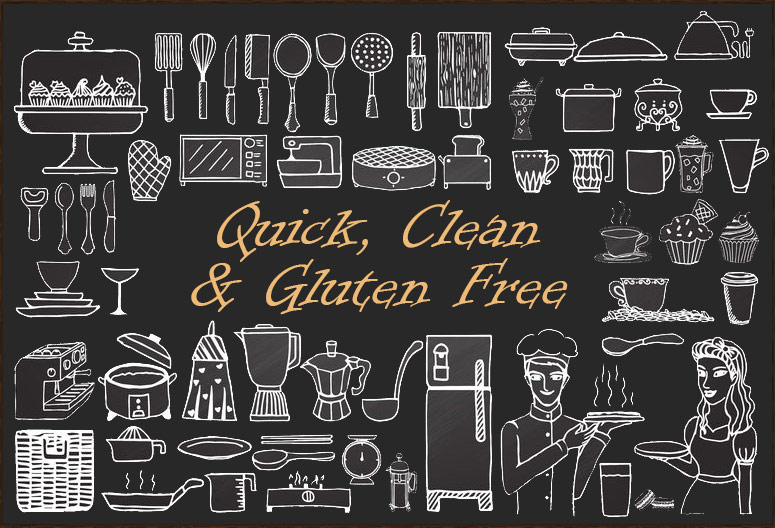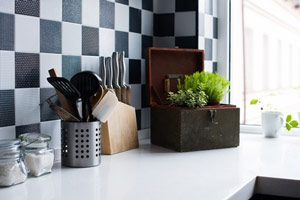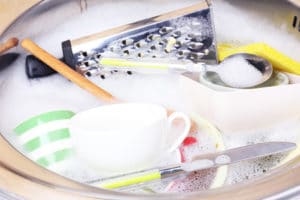
When You Don’t Live a Gluten Free Life
Chances are if you are living gluten free, you already have a Gluten Free Kitchen (oh for your sake, I hope so). If you are baking for someone who is living gluten free, or diagnosed with Celiac’s disease, we want to provide a few tips to make your kitchen safe prior to cooking or baking.
Gluten is present in wheat, rye and barley grains, but more insidious than the ingredients is cross contamination. Some people barely react, some people react horribly to the presence of even minute amounts of gluten. Cross contamination is the hardest part for those eating gluten free and it is what prohibits those of us with this issue from eating outside the home.
Cross Contamination Won’t Happen in a Gluten Free Kitchen
Here is the truth, that most pans and utensils will contain cross contamination with gluten. Gluten is very sticky by nature. This means we have to take a few little steps for safe for gluten free cooking. Our Test Kitchen of course contain nothing that could contaminate. But many who bake in solidarity for the gluten free are not so lucky. Cookies, crackers,breadcrumbs, pasta, you name it, most everything has gluten. It’s best to put everything in the cabinets if possible. If you have big jars of Flour, Sugar and the like on your counters, you might want to relocate them temporarily.
Surfaces

Flat surfaces are kind of easy. You start out with plain old soap and hot water. Yes, HOT WATER. If there is gluten on the surface of your counters or kitchen island, we need hot soapy water to break down the sticky gluten. Wipe, wipe, wipe those surfaces. Once that is completed and the surfaces have been cleaned, we use a secret weapon to ensure any gluten remaining breaks down. Our secret weapon – LYSOL Wipes!!! We love Lysol wipes. They are an important part of our cleaning arsenal when we cater food in peoples homes, or work in professional kitchens. Lysol wipes sterilize the surfaces leaving them pristine. Lysol wipes also have the ability to break down the proteins the gluten resides in rendering it harmless and ineffective.
To be honest, we know the problems with cross contamination, so we often do a wash, a wipe and a second wash to ensure the surfaces are truly safe for our gluten free goodies.
Baking Pans & Utensils
 When we first went to a totally gluten free kitchen, the thought of getting rid of our wooden spoon collection was difficult, but very very necessary. What is the point of cooking gluten free only to have a wooden or plastic spoon carry hidden contamination. So, to be safe, We use a great deal of stainless steel for our utensils. It makes cleaning in a mixed kitchen far easier.
When we first went to a totally gluten free kitchen, the thought of getting rid of our wooden spoon collection was difficult, but very very necessary. What is the point of cooking gluten free only to have a wooden or plastic spoon carry hidden contamination. So, to be safe, We use a great deal of stainless steel for our utensils. It makes cleaning in a mixed kitchen far easier.
If we are in a guest kitchen, and have not taken our trusty pans and utensils, we have to first clean everything in the sink. Again, Hot soapy water is our friend. I let the pans and utensils soak a few mintues. You have to get all the corners and seams of pans very well. It is in seams and corners and around any rivets that gluten can definitely hide. Rinse the pans, dry the pans and then if you are savvy, you have already guessed using lysol wipes on the pans. Then back into hot water for one final rinse.
Is All This Really Necessary?
Overkill? Well, not really, but I understand why you think so. My family’s first gluten poisoning after being diagnosed was from a pan. A wonderful pan that had many stews and wonderful stir-fries created within it. I knew it was time to create a truly Gluten Free Kitchen. Whether I liked it or not, I then got real in the kitchen. I threw out every pan we owned that was not stainless. For safety, we scrubbed the stainless steel twice.
Then I bought a new set of non stick cookware. My research showed that in non stick cookware, every ding or scratch in the lining left it vulnerable to gluten. The very nature of a scratch made it hard to eradicate the gluten fully. We could not afford to get contaminated. The reactions to contamination took almost a full two weeks to clear from the body.
What is the Big Deal About Gluten?
Well, eating gluten when you have Celiac’s Disease or Gluten Intolerance is a bit like putting sugar in a gas tank. It can corrupt a physical body just like sugar will destroy an engine. For me, it is a week of feeling like I have a bad case of the flu followed by a week of highly painful joint pain, which makes it nearly impossible to walk fully upright. It then leads to another week or so of just being sore all over. Have I forgotten to mention the inability to think straight thrown in there? My daughters do not react quite as badly, but it still takes more than two weeks for one tiny contamination to make it’s way fully out of the body.
If however, you do not have mystery joint pain, or mystery leaky gut syndrome, or are addicted to prilosec, then gluten is not a problem for you (YAY!!!). But, if you are like the many wonderful people in my life that create a gluten free kitchen on the day I come to visit, these tips will help you keep your friends and loved ones safe from the long term effects of a single gluten contamination.
Resources:
Information on Lysol Wipes
Truth About Gluten
Gluten and Kitchen Utensils
Don’t live near us? You can buy our mixes online in our gluten free baking mix store

Have you updated this post since you made it ? I am new to this and afraid to put much of anything in my mouth.
This post contains a lot of details I was looking for regarding this topic, thanks a lot for sharing as it has been very useful.
I can’t find unscented Lysol wipes to clean a countertop after using it to make regular flour pie dough.
Can you use scented Lysol wipes to clean the countertop after scrubbing it to remove any gluten left behind?
If yes, is there a better one to use then another?
Use whatever you can find. I personally use Lysol, but in a pinch, I have purchased Walmart’s great value brand. I am partial to lemon myself, but any scent will do.
I read above, that Lysol wipes break down gluten and brakes down any remaining gluten. Does that make the surface gluten free? Where did you find that information, since I could not find it on the Lysol site? I would like more information, since I am trying to help someone with a gluten disease live a normal life. If your Lysol statement is correct, it would be wonderful.
Hi,thanks for your question. Gluten is a protein based allergen. So, the rules for cleaning is the same for most proteins. I did not get it from the Lysol site. It is just basic allergen protocols.
Would lysol spray then work in the same way as the wipes, or do the wipes contain something different that somehow destroys the gluten molecules better? Just curious as I have liquid and spray and the wipes are less cost friendly and I also think the spray can get into cracks and crevices that the wipes couldn’t. I now wonder if I soak a pan in lysol, would it degluten it if my husband accidentally cross contaminates it. Could it de-gluten plastic after a soak and then a good run through the dishwasher to thusly remove the lysol? Hmm. I wish I had a science lab!
Ok. So shared things are difficult. I recommend glass for mixing. Plastic gets a lot of scratches easily and anywhere there is a scratch, is a place for the gluten to hide. In our bakery, we use a lot of glass because it is just easier to clean and maintain.
Although we keep a dedicated gluten free facility, we do work with nuts. And our protocols for nuts kind of drive our purchasing like gluten would in a potentially constantly contaminated environment.
The less the product takes on scratches, the easier it is to clean for gluten.
So, I have never used Lysol spray for cleaning anything I cook with. I am not sure how that would work. If I was going to soak something, I might be more likely to try a tiny amount of bleach in water. But honestly, I do not know.
I do buy off brand Lysol wipes for my home. It is far more economical. I couldn’t find Lysol wipes locally during the pandemic. I did switch to off brands out of necessity
Your post provides valuable insights into the challenges and considerations associated with gluten-free living, especially for those diagnosed with disease. The emphasis on cross-contamination is crucial, as it highlights a significant concern for individuals with gluten sensitivity. The fact that even minute amounts of gluten can cause adverse reactions underscores the importance of maintaining a gluten-free kitchen.
Your mention of the varying degrees of sensitivity among individuals is also noteworthy. Understanding that some people may react more severely than others emphasizes the need for diligence in preventing cross-contamination.
The tips you’re offering for creating a safe, gluten-free kitchen are likely to be immensely helpful for those who are new to gluten-free living or for individuals who are baking for someone with gluten sensitivity. It’s a thoughtful and considerate approach to share this information, promoting awareness and fostering a safer environment for those with dietary restrictions.
Overall, your post serves as a helpful resource, providing practical advice and fostering understanding about the challenges associated with gluten-free living. It’s commendable that you’re contributing to creating a more inclusive and accommodating environment for those who need to navigate gluten-free diets.
Thank you so very much. We take dietary restrictions very seriously. Many people with gluten issues have other issues and consequently restrictions. So it is very important to so many families. We try to make food delicious enough to share that takes into account all those restrictions.
Any recommendations for cleaning cell phone cases/screens? I teach Kindergarten and am in contact with gluten often. At the end of the day I have been cleaning with a Lysol wipe or windex, but am reading that I may Need to get soapy water to clean with. Any other recs?
Well, I of course would not recommend soapy water for a cell phone. It is recommended for counters, bowls and utensils.
So, gluten is like peanut butter. It’s a sticky protein. I would keep using the wipes. The most important thing to keep in mind is that it is recommended that to break down the sticky protein, the surface should be cleaned twice. Once to start to break down the protein and then to remove it more fully.
The question here is – are your current protocols leaving you feeling like you are getting exposed to gluten or are your protocols working? If you are doing ok with your protocols try not to worry. If you are getting hit up again and again by exposures, use two wipes on the phone.
I do wish you luck as kindergarteners need lots of help. Gloves – loose fitting gloves may help at snack times. I use them during food prep and they are easy to wear to prevent exposures
Is it possible to carry gluten particles home on my clothes from work and contaminate my ap. I wear gloves and an apron when demonstrating products. I do not do physical preparation of the food. It is done by the company. The reason I ask is my ttg stays mildly elevated. My docs say because I have numerous autoimmune diseases I probably won’t ever go to normal. I am not having any symptoms. Should I worry? Kristi
Kristi,
We work very hard here to stay gluten free. Our numbers are like .02, .05 that kind of thing. So, how serious it is depends on your numbers. I also have multiple autoimmune diseases and it does not mean that my numbers are elevated. I use liposomal curcumin to help with the inflammation with autoimmune issues, but I have not found the other autoimmune issues to increase the numbers.
If you are coming into direct contact with gluten on the products you are cooking/preparing, you could be exposing yourself to highers rates than you might want. Your body is not showing the signs. Your tests might be. I have been exposed to gluten walking through a deli with fresh rolls on a shelf. I was stupid enough to lean in and smell the bread. I ended up with an exposure. I am sensitive. I have house sat, used gloves for the gluten laden treats and still been exposed. Gluten can be airborne.
This is your body and your relationship with your diet. Only you can truly know what is best for you. If this is the job you have, and you can handle the possible cross contamination, then that is a choice you may need to make. As far as your apartment being contaminated, I would absolutely wear gloves at the job and throw them away once I was done and cleaned up. Our hands are the biggest carriers or cross contaminators. Use bleach based wipes to clean the doorknobs and counters if you are concerned. Try not to be anxious about it and do your best. We work hard to never be exposed, because we dont want to pass it along to a customer.
Just try your best. Stay safe, and enjoy your life in the stress of your diseases. It helps.
I am questioning your statement regarding Lysol breaking down gluten proteins. Gluten is not a microorganism that can be killed. I am in agreement that the act of “wiping” off the counter with Lysol wipes can remove gluten. but a wet wipe of any sort would do the same. That said, Lysol spray cannot break down or kill gluten. Again, gluten is a protein and not a microorganism that can be killed.
I am not talking about killing organisms. I am talking about breaking down the protein which is sticky. To remove the gluten from a surface, the protein needs to break down in order for it to be quickly and easily cleansed from the surface. Water alone does not do this. Water cannot break down the proteins, but Lysol wipes do. They also keep the kitchen surfaces clean and sanitary. One can choose to use hot soapy water. I use it all. I run a bakery and surfaces need to be clean.